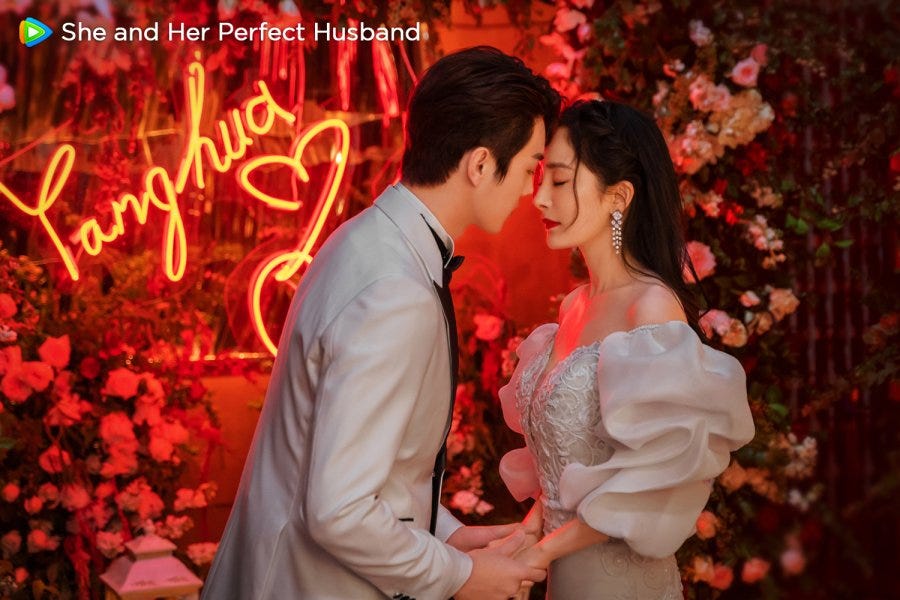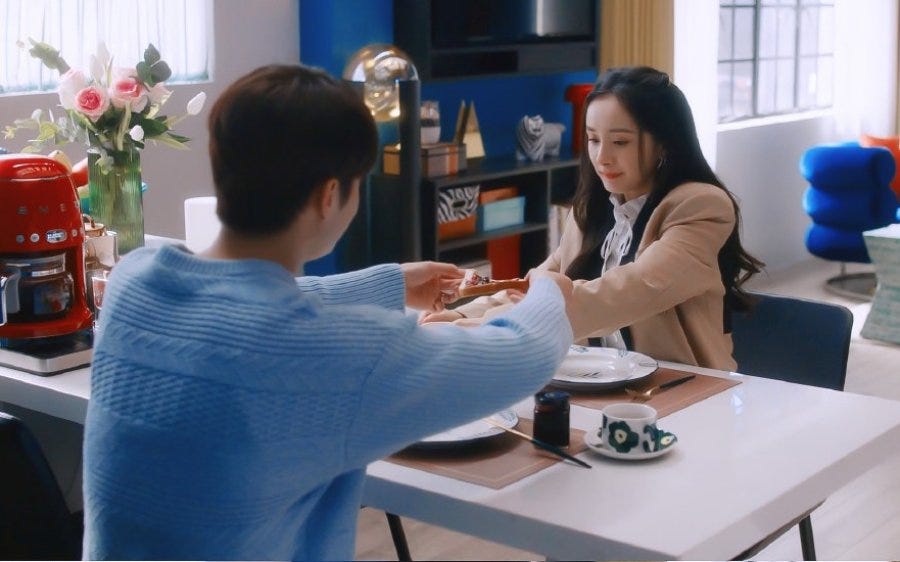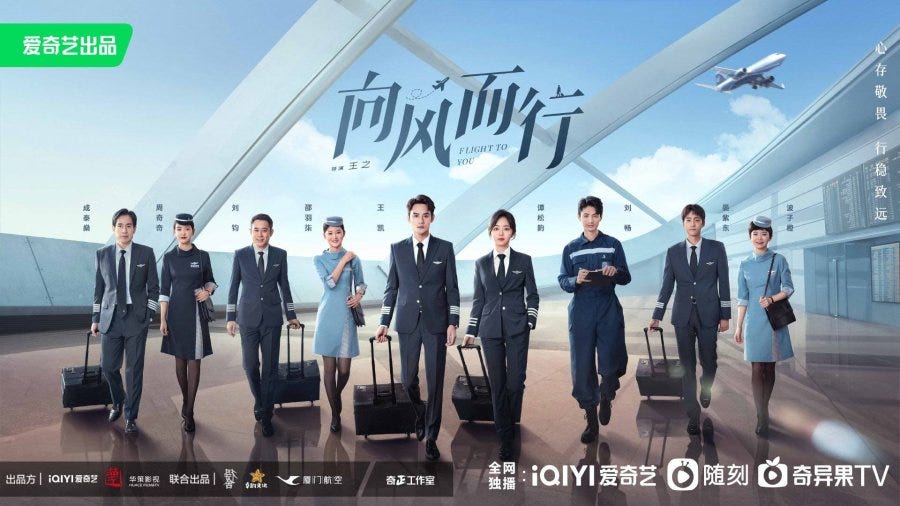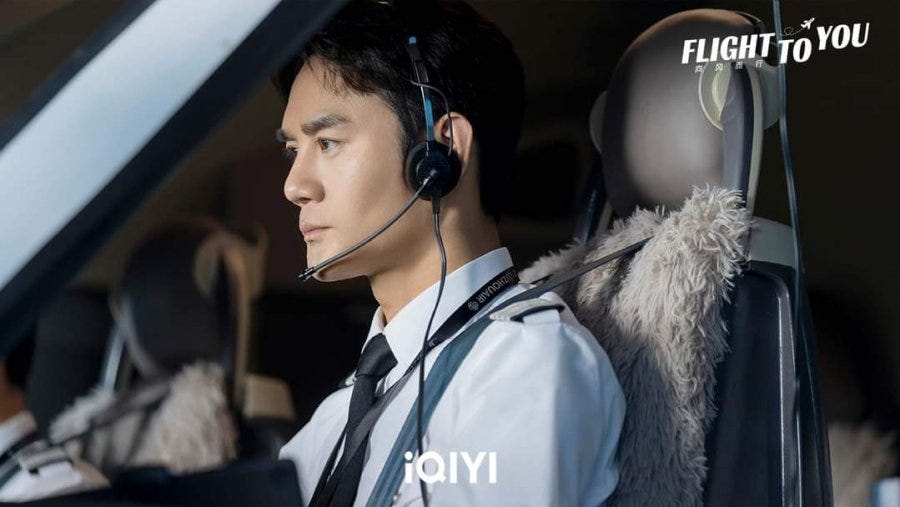Contract Marriage and Pygmalion Stories: She and Her Perfect Husband (2022) Flight to You (2023)
It occurred to me after watching the finale of She and Her Perfect Husband what’s been wrong with so many K dramas resolutions of late. A show goes merrily along on its way — all fairytale-like complete with soap opera high jinks and then voila right in the final act/phase, the showrunners decide that a dose of realism needs to be injected right at the end to bring us all back down to earth with a thud. The show breaks immersion, the audience suffers whiplash and some of us wonder what it is we’ve been watching. It also breaks the social contract between viewer and writer about the promise of escapism and what that looks like. That famous line often attributed GK Chesterton certainly applies here. “Fairy tales do not tell children the dragons exist. Children already know that dragons exist. Fairy tales tell children the dragons can be killed.” That insight would go a long way in explaining the outrage against “bad endings”.
Contract marriage stories are a guilty pleasure of mine because despite the implausible scenarios that play out they usually have insightful things to say about marriage. In our present landscape of people having far too many choices than they know what to do with, a contract marriage feels like a throwback to another time and place where two people come together in matrimony not because they’re in love with each other but for pragmatic reasons. The two individuals have common cause and a mutually beneficial arrangement separate from any feelings that they might have for each other. They spend a lot of time in the same space and get to know each other much better. Eventually because they are both decent human beings they (inevitably) fall in love with each other. In such cases, the commitment to the “contract” comes first and then the emotions follow.
In most ways contract marriages are not that different from so-called “love matches”. What the mechanism does is bring together two people who otherwise will never meet. Or have no reason to meet ordinarily. The catalyst can be ridiculous in the extreme but the way the dynamic develops overtime is not dissimilar to two people who meet at the office or at a party for the first time. Fundamentally the same rules apply. In order for two people to “fall in love” certain elements must be present in every instance regardless of the context.
That’s why I don’t think a divorce to reset everything (if indeed that’s what it is) is really needed at the end despite Yang Hua’s stated intentions. He claims it’s because he wants to give her space to decide if she wants this marriage to continue despite it starting off as a facade to placate her employers. He implies that their marriage wasn’t “real” to begin with because it was for her convenience and his of course. What comes afterwards however isn’t a lie. Besides Yang Hua isn’t really just going to give her up anyway. All he wants in actual fact is for her to say “I love you” to him loudly and clearly without any hesitation. A divorce feels like something of an overkill and understates the challenges that every married couple have to deal with. Especially when he’s perceptive enough to know that the love that had sprung up between them is real regardless how it all began.
In the end all of this comes across as a disingenuous move regardless of the seemingly high-minded idealism that accompanies it. Yang Hua may say he’s trying to set her free so she can spend her free time contemplating about what she wants but behind the scenes he’s helping her with the sexual harassment case, he’s collaborating with an old girlfriend to provoke Qin Shi to jealousy. Divorce and marriage are no trivial matters as her father rightly says. Divorce is the end point when all other means of communication or actions to make things work have been thoroughly exhausted. To him he is acting with nobility. To me as a viewer he is using “divorce” to get something out of her that he doesn’t think he can any other way. He wants a very specific answer from her. This why the resolution is a soft “meh” for me. If the final separation was about the marriage being a sham, then the show should have ended with more than a backhanded proposal or commitment on his part using an investment graph for a theme suitable metaphor. In the end he’s still the one who does the heavy lifting to win her back. Not that there’s anything inherently wrong but it defeats the whole purpose of the divorce — which is really just a insipid plot device. If the divorce was about him giving way to Tao Junhui, that’s another thing entirely.
The reality is that every marriage is transactional to some degree despite all this talk about “love” or feelings. No one marries purely for love. People end up marrying the person that they do because each offers something to the other. Whether it’s for lifelong companionship, security or material wealth. Both have needs that they believe only the other person can meet. It’s naive to think otherwise. That’s why any male lead comes across as swoony when he goes above and beyond the call of duty for the object of his desire. The doing is just as important as the feeling.
For the most part I liked She and Her Perfect Husband. The leads were likeable, strong-minded adults who were madly navigating other people’s agendas while keeping true to the their own principles and boundaries. The age gap wasn’t a problem for me because Xu Kai’s Yang Hua is far more mature than most people in the show including his lady love Qin Shi and at times the older generation. Not everything about the mixed bag of an ending was misplaced. Qin Shi (Yang Mi)moving on from her law firm, Chen and Hui is foreshadowed early on and I was only surprised that it took as long as it did for her to finally make her exit. Yang Hua (Xu Kai) finally getting back on the saddle again was also fitting although not as triumphantly as one might be accustomed to. There aren’t too many highly intelligent, astute male leads that would be willing to take a back seat to their female romantic partners although there are many instances of healthy accommodation between the two through their earnest interactions. All throughout the two had genuine respect for one another’s quirks and stances. Which makes the final episodes of the drama somewhat off-kilter.
Much of the show revolves around relationships between the sexes while they juggle workplace entanglements. The storyline reflects that especially in the relationships between old flame Tang Junhui and his less mature fiancee Wu Fei as well as the one between brother Wenyu and bestie Meimei. It’s not hard to see where the writer was going with those although some of those antics were uncomfortable to watch on screen. It’s a truism… and I’ve been saying this a lot the past few years… people are their own worst enemies. They gravitate towards doing what’s easiest not necessarily what’s best. It would scarcely be surprising then to hear that I didn’t always agree with the utterances that fell off the lips of flawed human beings that dotted this landscape and there’s little doubt that characters often said things that they didn’t believe in either. There is undeniably a contest of ideas all throughout ranging from the deeply cynical to the naively idealistic.
At times I found the writing of the dialogue uneven. One of the problems I have with C dramas is the heavy-handed tendency to use dialogue to prop up an underdeveloped romance. This happens most often in genre shows like police procedurals. Recurring or supporting characters are used obviously to tell the audience (just in case we’re all blockheads or not buying into the pairing) that the leads have latent feelings for each other through relentless teasing and gossiping. It’s often a poor substitute for “showing” and it’s the writer’s way of having her cake and eating it too ie. not having to make the effort to integrate a well-built up romance with the rest of the story beats.
My opinion about this show shifted several times. I began by believing that this was primarily about the contract marriage. I soon changed my mind and saw it as a legal-business drama because the romance was relegated to the sidelines. Later I began to see it as a workplace drama only to finally conclude that despite all the trappings of workplace jargon and interactions this is really a melodrama about the mayhem that is modern marriage.
Wang Kai looks like he’s in dire need of sleep in Flight to You in his latest outing starring opposite Tan Songyun. Perhaps he’s making a salient point here about being a commercial passenger pilot: His circadian rhythms have been shot to smithereens as a result of shift work and jet lag. Nonetheless he’s still a good-looking chap when he breaks into a rare smile and it’s a breath of fresh air to know that he’s not all that afraid of ageing.
I can never get upset with Wang Kai even when he’s a tyrant here with Tan Songyun’s Cheng Xiao because despite his rigid adherence to rules, I’m assured that if I’m ever onboard a plane with him in the cockpit, that I’m in good hands. He’s a man whose obsessively concerned with safety and who can blame him when there are a couple of hundred people relying on him to get them from A to B completely intact.
Wang Kai is Gu Nanting, an experienced commercial pilot and a pilot instructor with a reputation of being a hard taskmaster. Along comes Cheng Xiao who becomes his apprentice when the airline that they both work for decide to make the freight operations side of the business obsolete. She’s a rare female pilot and unknown to her, their chief of the flight department Jiang Tao has a not-so-unconscious bias about females flying airplanes. What she’s also unaware of is that Gu Nanting is desperately trying to give her a chance to prove herself and to prevent her sacking by the company. She, not privy to the conversations among the higher ups, think that he’s deliberately making things difficult for her out of some irrational dislike for her.
Wang Kai’s dynamic with Tan Songyun is similar to the one he had with Olivia Wang in When a Snail Falls in Love. It’s a Pygmalion story. And Wang Kai’s got the gravitas to pull it off. The mentor though incredibly demanding on his apprentice eventually falls for her despite their early clashes. Tan Songyun plays the sort of role she’s been playing consistently for a while now — a determined ambitious woman with plenty of sass.
To be frank, I almost gave up on this after the third episode. I didn’t care much for Cheng Xiao to begin with and the show seemed to plod at snail’s pace. But few dramas are good right off the bat so I gave it a chance and I’m glad I did. The student-teacher dynamic does take precedent over the romance but where I’m at now (Episode 19), Cheng Xiao has openly expressed to her colleague Song Song that she’s “openly in love” with Nanting. In all honesty, the romance and the looming love polygon is probably the least interesting part of the show as I find myself more drawn to the logistical side of air travel from the cabin crew to the management side of things. Like all organizations of this scope, things do get a little complex because human beings are involved from top to bottom. Regardless of how the romances go, I think this show does a better job of integrating the supporting characters with the leads’ respective arcs than say, Thank You, Doctor.
The other aspect of the show that I like is the acknowledgment that not everyone is or can be good at everything. Even those at the top of the game. Everyone has their skill set and can bring something to the table. The CEO of Luzhou makes an important observation which bears repeating here — To use one’s strengths to cover (overcome) one’s weaknesses. Anyone who has even an iota of self-aware knows that it’s the key to the success of not just of individuals but to organizations.
When the characters are not making mistakes and learning from them, the villain of the piece seems to be Jiang Tao who is actively trying to keep female pilots out of the company under his watch. While I wouldn’t be quick to use the word “misogyny” as people are wont to these days, I am curious about where that insistence is coming from. Other than the usual economic/biological arguments, that is. I don’t think economic arguments are necessarily invalid because it all boils down to the kind of image that a company/industry wants to project publicly and whether or not having female pilots is a good PR/marketing move. Of course, every company needs to decide if profits matter more than politics. Do they want to invest all that time in training a pilot only for her to leave after 10 years? That’s also assuming that all their pilots, male and female, are lifelong employees. Some companies think bigger than that and recruit for the good of the entire industry. It’s the same sort of issues that Qin Shi and her firm were facing in She and Her Perfect Husband. Certainly loyalty should go both ways and sadly, it often doesn’t.
Although I’m not exactly surprised that not only has Cheng Xiao got her eye on Nanting, the flight attendant Li Yuheng who has been crushing on him from childhood is also making moves on him. However, with a normally driven guy like Nanting at the centre of this romance, it’s always best that he makes the first move despite Cheng Xiao’s obvious attempts to ingratiate herself into his life. Although I know he likes Cheng Xiao, he has a lot of baggage coming into this — guilt about his ex, a feeling of unworthiness. Plus he might not think that starting a romance with an apprentice is necessarily appropriate for a man in his position. Afterall he’s a very proper… by-the-book sort of guy.
I’m half way through and am enjoying this show. It hits all the right notes and there’s enough of substance in the various arcs that makes me feel that I want to keep going… for now.







